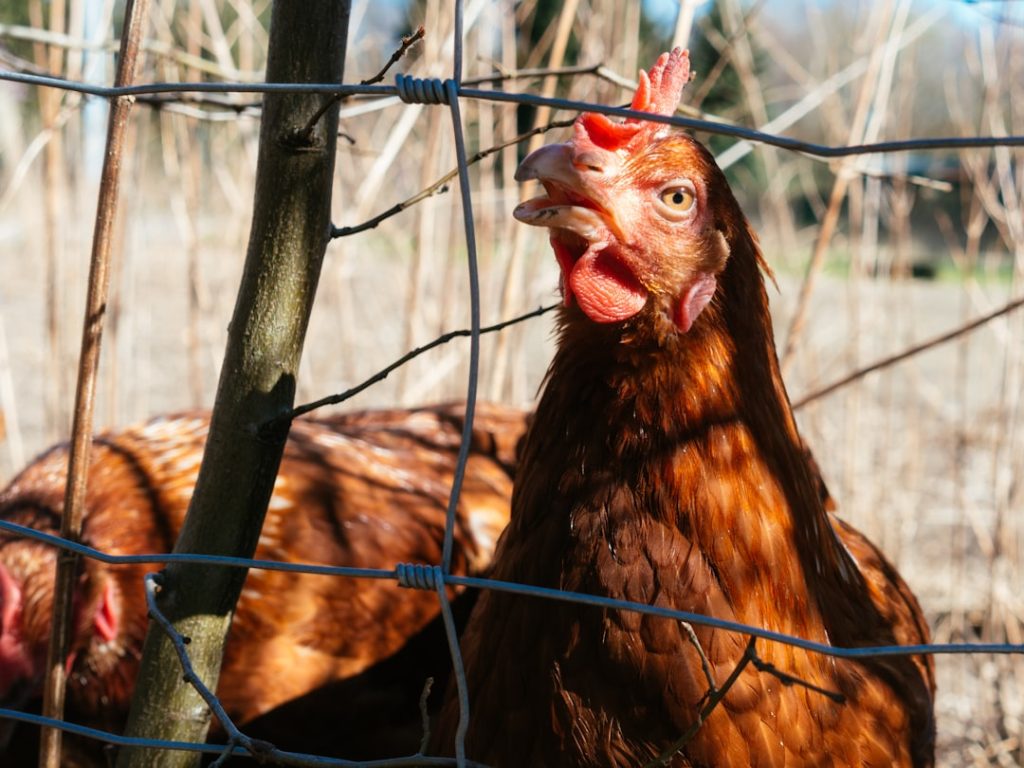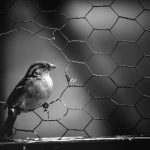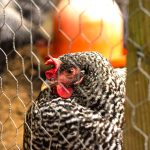Chickens are naturally curious and exploratory animals, often investigating their environment and pecking at objects of interest. They are attracted to bright colors and shiny items, which can draw them to gardens with colorful flowers and vegetables. Chickens possess a natural instinct to scratch and forage for food, potentially causing damage to garden soil.
These behaviors are important to consider when developing strategies to prevent chickens from entering and damaging gardens. As social animals, chickens follow a hierarchical structure within their flock. If one chicken discovers access to a garden, others are likely to follow.
Chickens also have a keen sense of smell, which can influence their behavior in gardens. Understanding these natural behaviors and instincts is crucial for effectively implementing deterrents to keep chickens out of garden areas.
Table of Contents
- 1 Creating Physical Barriers
- 2 Using Natural Deterrents
- 3 Implementing Visual Deterrents
- 4 Utilizing Scents and Smells
- 5 Providing Alternative Spaces for Chickens
- 6 Consistently Monitoring and Maintaining the Garden
- 7 FAQs
- 7.1 What are some effective ways to keep chickens out of gardens?
- 7.2 What are some plants that chickens dislike and can be used as natural deterrents?
- 7.3 How can fences or chicken wire be used to keep chickens out of gardens?
- 7.4 What are some alternative areas that can be provided for chickens to forage and explore?
Key Takeaways
- Chickens are naturally curious and will explore their surroundings, including gardens
- Physical barriers such as fences and netting can effectively keep chickens out of garden areas
- Natural deterrents like predator decoys and reflective objects can help deter chickens from entering gardens
- Visual deterrents such as scarecrows and motion-activated devices can startle chickens and discourage them from entering gardens
- Scents and smells like citrus, vinegar, and hot peppers can be used to repel chickens from garden areas
Creating Physical Barriers
Installing Fencing
One of the most effective ways to keep chickens out of your garden is by creating physical barriers that prevent them from gaining access. This can be achieved by installing fencing around the perimeter of the garden, ensuring that it is tall enough to prevent chickens from flying over or jumping through. Additionally, burying the bottom of the fence underground can help prevent chickens from digging underneath it to gain access.
Using Chicken Wire or Mesh Netting
Another physical barrier that can be effective in deterring chickens is the use of chicken wire or mesh netting. This can be placed over specific areas of the garden, such as raised beds or individual plants, to prevent chickens from pecking at them.
Securing the Barriers
It is important to ensure that the wire or netting is securely fastened and covers the entire area to be effective in keeping chickens out.
Using Natural Deterrents
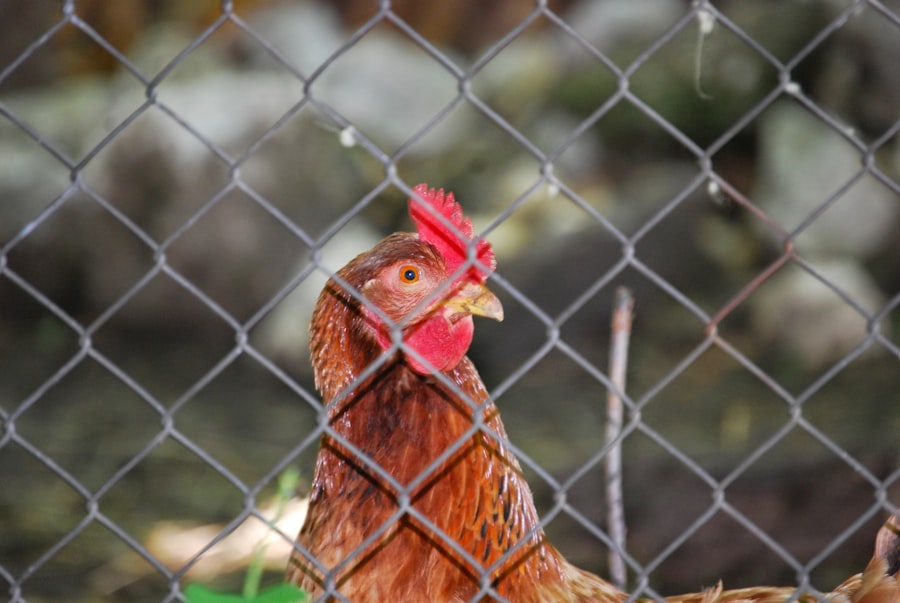
In addition to physical barriers, there are natural deterrents that can be used to discourage chickens from entering the garden. One such deterrent is the use of predator decoys, such as fake owls or hawks, which can be placed strategically around the garden to create the illusion of a threat to the chickens. The presence of these decoys can make chickens feel unsafe and less likely to enter the garden.
Another natural deterrent is the use of plants with strong scents that chickens find unpleasant. For example, planting herbs like rosemary, thyme, or lavender around the perimeter of the garden can help deter chickens from entering. These strong-smelling plants can mask the scent of the garden’s crops and make it less appealing to chickens.
Implementing Visual Deterrents
Visual deterrents can also be effective in deterring chickens from entering the garden. One common visual deterrent is the use of reflective objects, such as CDs or mirrors, which can be hung around the garden to create flashes of light and movement that can startle and deter chickens. Additionally, scarecrows can be used as visual deterrents, as their presence can create the illusion of a potential threat to the chickens.
Another visual deterrent that can be effective is the use of motion-activated sprinklers. These devices can be set up around the perimeter of the garden and will spray water when they detect movement, startling and deterring any chickens that come too close. The sudden burst of water can be an effective way to discourage chickens from entering the garden without causing them any harm.
Utilizing Scents and Smells
Chickens have a strong sense of smell and are attracted to certain scents, which can be used to your advantage in deterring them from entering the garden. One effective way to utilize scents and smells as a deterrent is by using natural repellents such as citrus peels, garlic, or vinegar. These strong-smelling substances can be scattered around the perimeter of the garden or placed in strategic locations to create an unpleasant environment for chickens.
Another way to utilize scents and smells as a deterrent is by using essential oils with strong odors that chickens find unpleasant. Oils such as peppermint, eucalyptus, or citronella can be diluted with water and sprayed around the garden to create a barrier that deters chickens from entering. It is important to reapply these scents regularly, especially after rain, to maintain their effectiveness as a deterrent.
Providing Alternative Spaces for Chickens
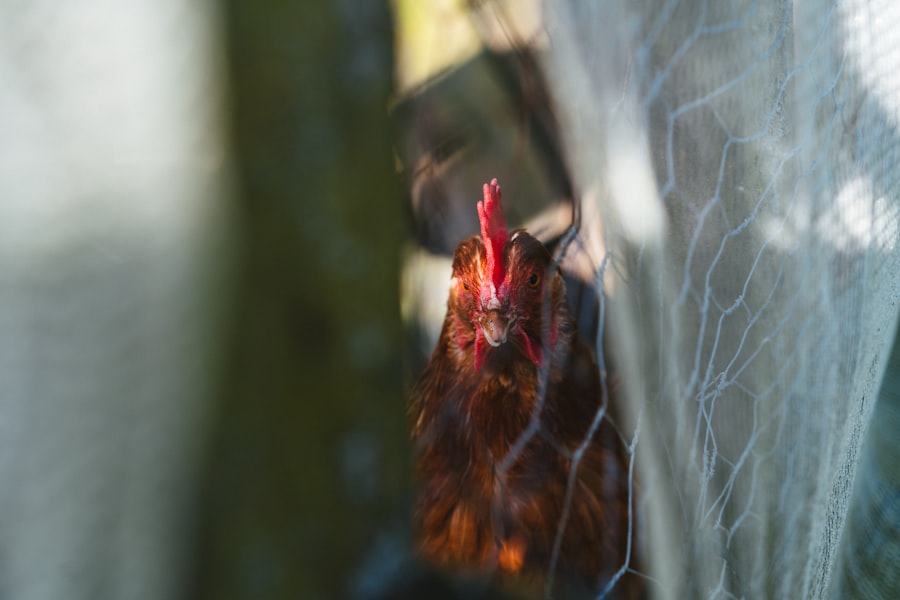
Designated Areas within the Coop or Run
Creating designated areas within the chicken coop or run where they can scratch and peck at the ground can provide them with an alternative source of entertainment and food. This can help keep them occupied and less likely to seek out the garden for entertainment.
Enrichment Activities
Providing enrichment activities such as hanging treats or toys can also help keep chickens occupied and distracted from the garden. This can be a fun and engaging way to keep them entertained and satisfied.
Separate Foraging Areas
Another way to provide alternative spaces for chickens is by creating a separate foraging area outside of the garden where they can explore and scratch without causing damage. This can be achieved by designating a specific area of the yard for chickens to roam freely, providing them with a safe and controlled environment to satisfy their natural instincts without encroaching on the garden.
Consistently Monitoring and Maintaining the Garden
Consistently monitoring and maintaining the garden is crucial in deterring chickens from entering and causing damage. Regularly inspecting the perimeter for any signs of wear or damage to physical barriers such as fencing or netting can help ensure that they remain effective in keeping chickens out. Additionally, it is important to promptly repair any damage or weak spots in the barriers to prevent chickens from finding a way in.
Another important aspect of monitoring and maintaining the garden is keeping it well-maintained and free of debris that may attract chickens. This includes regularly removing fallen fruits or vegetables, as well as keeping the area free of weeds and overgrown vegetation that may provide hiding spots for chickens. By consistently maintaining the garden, you can create an environment that is less appealing to chickens and reduce the likelihood of them entering and causing damage.
In conclusion, understanding the behavior of chickens is essential in finding effective ways to deter them from entering and causing damage to your garden. By creating physical barriers, using natural deterrents, implementing visual deterrents, utilizing scents and smells, providing alternative spaces for chickens, and consistently monitoring and maintaining the garden, you can effectively deter chickens and protect your plants from damage. With careful planning and implementation of these strategies, you can create a garden that is off-limits to chickens while still providing them with a safe and enriching environment.
If you’re looking for more information on keeping chickens, you might want to check out this article on where to put a chicken coop. It offers valuable insights on the best location for your coop to ensure the health and safety of your chickens while also minimizing their impact on your garden.
FAQs
What are some effective ways to keep chickens out of gardens?
Some effective ways to keep chickens out of gardens include using physical barriers such as fences or chicken wire, using natural deterrents like plants with strong scents or textures that chickens dislike, and providing alternative areas for chickens to forage and explore.
What are some plants that chickens dislike and can be used as natural deterrents?
Plants that chickens dislike and can be used as natural deterrents include marigolds, lavender, mint, and rosemary. These plants have strong scents or textures that chickens tend to avoid.
How can fences or chicken wire be used to keep chickens out of gardens?
Fences or chicken wire can be used to create physical barriers to keep chickens out of gardens. These barriers should be at least 4 feet high and buried a few inches into the ground to prevent chickens from digging underneath.
What are some alternative areas that can be provided for chickens to forage and explore?
Alternative areas that can be provided for chickens to forage and explore include designated free-range areas, chicken tractors, or portable fencing to create temporary grazing areas. These areas can help redirect the chickens’ natural foraging instincts away from the garden.
Meet Walter, the feathered-friend fanatic of Florida! Nestled in the sunshine state, Walter struts through life with his feathered companions, clucking his way to happiness. With a coop that’s fancier than a five-star hotel, he’s the Don Juan of the chicken world. When he’s not teaching his hens to do the cha-cha, you’ll find him in a heated debate with his prized rooster, Sir Clucks-a-Lot. Walter’s poultry passion is no yolk; he’s the sunny-side-up guy you never knew you needed in your flock of friends!

